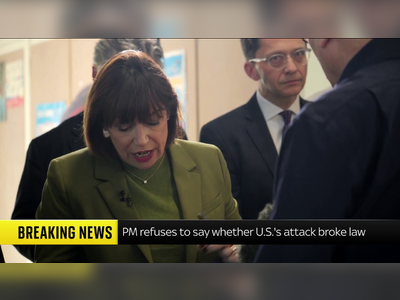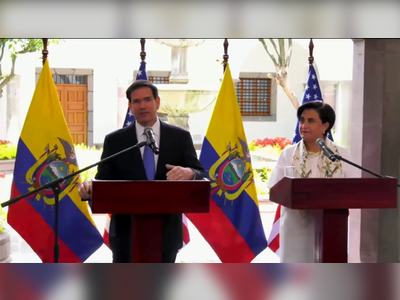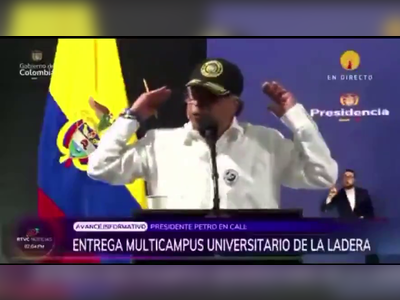0:00
0:00
Trump's ambassador nominee confirmed Canada's sovereignty during trade disputes.
Peter Hoekstra, who has been nominated to serve as the U.S. ambassador to Canada, highlighted the importance of honoring Canada’s sovereignty during his Senate confirmation hearing.
Washington, D.C. – During his Senate confirmation hearing, Peter Hoekstra, President Donald Trump's choice for U.S. ambassador to Canada, acknowledged Canada as a sovereign nation and expressed his intention to respect its sovereignty.
His comments arrive amid increased tensions associated with a global trade conflict, particularly concerning the United States and its North American neighbors.
In response to a query from Senator Chris Coons of Delaware, Hoekstra affirmed, "Canada is a sovereign state, yes," countering any comparisons to it being the 51st state of the U.S.
Hoekstra, a former Republican congressman from Michigan, is anticipated to receive confirmation alongside Ronald Johnson, nominated for ambassador to Mexico, and George Glass, nominated for ambassador to Japan.
The Senate Foreign Relations Committee hearing reflected a notably conciliatory tone in contrast to the current diplomatic environment, which is characterized by contentious discussions regarding U.S. relations with Canada and Mexico.
Hoekstra emphasized the enduring partnership between the U.S. and Canada, while also highlighting Trump’s emphasis on promoting "freer, fairer trade" that he claims would benefit Canadian enterprises.
Hoekstra's nomination underscores ongoing U.S. interests in Canada, Mexico, and Japan, which are among America's top five trading partners.
Ronald Johnson focused on enhancing U.S.-Mexico trade relations, yet he raised the possibility of unilateral U.S. military action in Mexico if American lives were endangered.
This potential viewpoint has elicited reactions from Mexican President Claudia Sheinbaum, who cautioned that such actions would violate Mexico’s sovereignty.
The backdrop of these discussions includes Trump’s previous threats to impose substantial tariffs on various imported products, triggering retaliatory threats and fears of a comprehensive trade war that could disrupt financial markets and escalate recession anxieties.
Additionally, Trump has made provocative remarks suggesting that the United States should annex Canada, complicating diplomatic relations further.
In conversations related to Japan, George Glass indicated that the U.S. is likely to pursue negotiations for an increase in Japan’s financial contributions towards maintaining U.S. military forces stationed there, with that agreement set for renegotiation in 2027. He pointed out that the presence of around 60,000 U.S. troops in Japan, alongside Tokyo’s annual contribution of approximately $1.4 billion for U.S. military expenses, is crucial in light of evolving Chinese military capabilities necessitating an enhanced American response.
Glass also referenced a significant backlog of $50 billion in U.S. military equipment orders from Japan and proposed exploring co-production initiatives as a more efficient strategy for meeting defense requirements.
He described the current U.S.-Japan alliance as being at an "all-time high," considering the recent commitments to improve diplomatic relations between the two countries.
His comments arrive amid increased tensions associated with a global trade conflict, particularly concerning the United States and its North American neighbors.
In response to a query from Senator Chris Coons of Delaware, Hoekstra affirmed, "Canada is a sovereign state, yes," countering any comparisons to it being the 51st state of the U.S.
Hoekstra, a former Republican congressman from Michigan, is anticipated to receive confirmation alongside Ronald Johnson, nominated for ambassador to Mexico, and George Glass, nominated for ambassador to Japan.
The Senate Foreign Relations Committee hearing reflected a notably conciliatory tone in contrast to the current diplomatic environment, which is characterized by contentious discussions regarding U.S. relations with Canada and Mexico.
Hoekstra emphasized the enduring partnership between the U.S. and Canada, while also highlighting Trump’s emphasis on promoting "freer, fairer trade" that he claims would benefit Canadian enterprises.
Hoekstra's nomination underscores ongoing U.S. interests in Canada, Mexico, and Japan, which are among America's top five trading partners.
Ronald Johnson focused on enhancing U.S.-Mexico trade relations, yet he raised the possibility of unilateral U.S. military action in Mexico if American lives were endangered.
This potential viewpoint has elicited reactions from Mexican President Claudia Sheinbaum, who cautioned that such actions would violate Mexico’s sovereignty.
The backdrop of these discussions includes Trump’s previous threats to impose substantial tariffs on various imported products, triggering retaliatory threats and fears of a comprehensive trade war that could disrupt financial markets and escalate recession anxieties.
Additionally, Trump has made provocative remarks suggesting that the United States should annex Canada, complicating diplomatic relations further.
In conversations related to Japan, George Glass indicated that the U.S. is likely to pursue negotiations for an increase in Japan’s financial contributions towards maintaining U.S. military forces stationed there, with that agreement set for renegotiation in 2027. He pointed out that the presence of around 60,000 U.S. troops in Japan, alongside Tokyo’s annual contribution of approximately $1.4 billion for U.S. military expenses, is crucial in light of evolving Chinese military capabilities necessitating an enhanced American response.
Glass also referenced a significant backlog of $50 billion in U.S. military equipment orders from Japan and proposed exploring co-production initiatives as a more efficient strategy for meeting defense requirements.
He described the current U.S.-Japan alliance as being at an "all-time high," considering the recent commitments to improve diplomatic relations between the two countries.
Comments

Oh ya 297 days ago
The tariffs and fees and wanting Canada and Greenland so he can strip them of natural resources is just more proof that the USA is busted and not to be trusted. circling the toilet bowl











